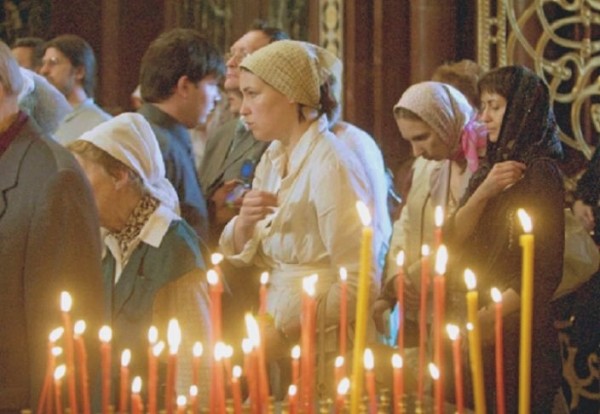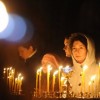“The Eucharist is always a going out from this world”
Recently one of our greeters approached a visitor after liturgy asking, “So, what did you think?” The response was unexpected. “Such a beautiful church: the icons, the singing. But I couldn’t pray very well or understand much of the prayers because the people around me were chatting throughout the service.” Unfortunately, not the lasting impression we’re striving for.
Now, just for the record, I’m the priest that once didn’t even notice a visitor’s child drinking from his bottle while seated on the bottom step of the ambo. So chatting during services is not a pet peeve of mine. I once served with a clergyman who halted liturgy, called out chatters, and refused to continue until the room was completely silent; so chatters, count yourselves lucky.
However, put frankly, adults participating in any degree of conversation not essential to worship or the instruction of their children is unacceptable. We gather at church services for one purpose only: prayer. And the appropriate words to speak during services are clearly identified in the available booklets at the lines labeled “People.”
Confronted with the reality, we can rebel against what might appear to be a legalistic directive. Or, in humility and love for God, we simply admit our error, repent, and quickly move on to forming a new habit. Aiding our effort are the words of inspiring spiritual mentors such as these:
“[Liturgy is] the gathering together of heaven and earth and all creation in Christ—which constitutes the essence and purpose of the Church itself. . . . The Eucharist is always a going out from ‘this world’ and an ascent to heaven” (Fr. Alexander Schmemann).
And,
“the Eucharist is an offering to God . . . thanksgiving and praise are offered and we express noetic contemplation of God’s glory, we bring to mind the creation of the world, the coming of the Son of God, His earthly life, the Mystical Supper, the death upon the Cross, and the Resurrection, and we raise up a prayer that the Holy Spirit might be sent down upon the Gifts that have been set forth” (Fr. Michael Pomazansky).
Therefore, every parishioner is spiritually obligated to resist bringing the world into worship. For this reason, most sources of church etiquette contain something like this:
“Isn’t it great to come to church and see friends and family members? But wait until after the service to talk to them. It is not appropriate to greet people and have conversation with them during the services. Besides being disrespectful towards God, it is rude towards other people in the church who are trying to worship. Talk to God while in church through your prayers, hymns, and thanksgiving, and to your friends outside, afterwards” (Holy Virgin Cathedral).
As Father Thomas Hopko exhorts us,
“One who participates in liturgical prayer should put his whole being, his whole mind and heart, into each prayer and petition and liturgical action, making it come alive in himself. If each person does this, then the liturgical exclamations become genuine and true, and the whole assembly as one body will glorify God with ‘one mouth, one mind and one heart.’”
So, let us pray, not chat. When you enter the church, venerate the icons, take the priests’ blessings, and simply smile a greeting at your neighbors, but please don’t talk once inside the church. Listen to the words of the prayers and hymns. Make the words your own. Services are an opportunity to freely connect with God. Let your love for Him be the priority.




















